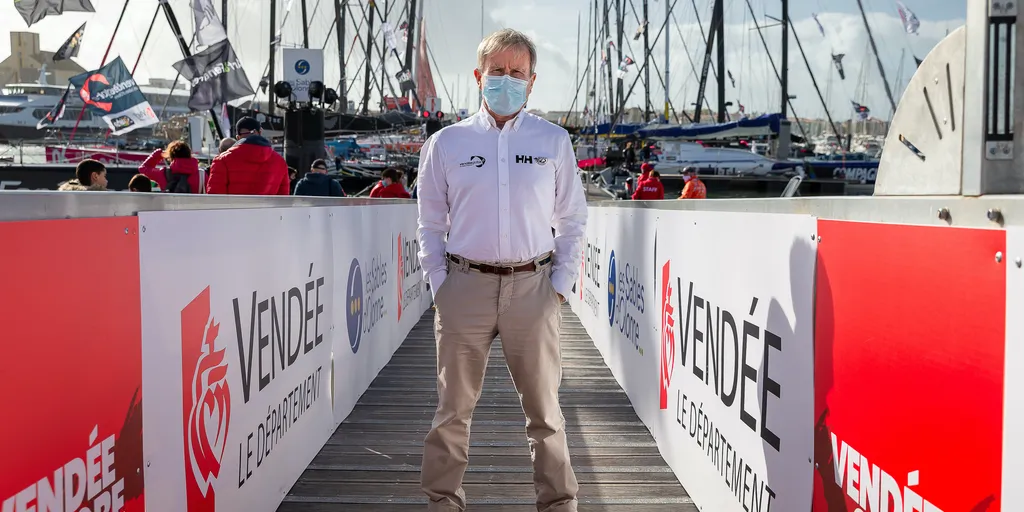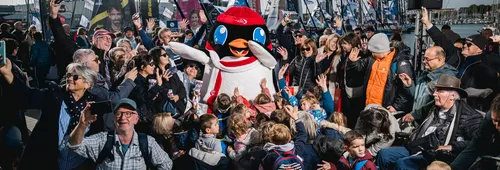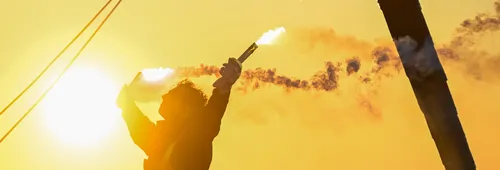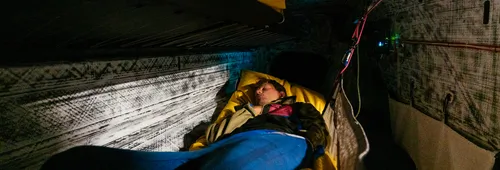Can you explain the protocol that is in place for Alexia Barrier for her back injury?
As soon as Alexia crosses the finish line tomorrow I will get on board I will make an initial assessment of her condition and then decide on her exact finish protocol her access on to the pontoon to her press conference. We will try to keep the protocol as close to what is planned but that will depend on what we find out when I examine her I am quite confident that her finish wlll be in good conditions. Since yesterday she has reduced her treatments so things are a bit better.
So once the actual finish protocol – the arrival, the pontoon, the press conference – what will happen to her?
As soon as her protocol is done of we will have to do x-rays. This will allow really see what is going on and if it is what we suspect. Anyway, for this kind of pain there is no specific treatment, she will not be operated on be kept in hospital.
Can you remind us what happened to Alexia?
Alexia fell backwards. What happened is probably a bit similar to what happens when you have a broken rib, as happened to Romain (Attanasio) and Sam (Davies). For those who have experienced it, it is very painful, especially when you have to move, to manoeuvre on a boat. If it affects the bottom of the spine, it is even more painful. It can take a long time to get better and it is even longer when you are not properly immobilized. When there is a fracture it will take time to repair itself and the pain will continue. Pain is our body’s way of saying "beware, here I am in pain, protect me"
What relationship do you have with the skippers?
I am completely bound by confidentiality. There are things that happen during the race that stay between doctor and patient. This is the principle of teleconsultation. I maintain medical confidentiality until the patient, in this case the runner, feels they can talk about it more widely. It is done live maybe even when if the life of the skipper might be in danger or simply if his or her course may be altered or if the boat slows down abnormally, these things might alert race direction. In this case, I update them with my explanation of the medical situation but without going into detail. And it remains confidential.
How does the teleconsultation work?
Often the teleconsultation takes place live but I prefer the written word. Words change in interpretation and the writings remain. When it comes to a medical prescription, I always write a document in which I explain exactly the treatment to be followed, the duration, the quantities. If require specific actions to be taken, I explain them very precisely. When you're on the phone, especially on a boat, you can get distracted at one point or another. Writing it allows you to reread it if necessary and avoid misinterpretations and maybe omissions. I can also receive photos or videos, this is obviously useful for any visible injuries, maybe even a broken limb if there is a deformity.
What has happened that you can talk about on this edition?
There have been some pretty amazing things. This is the first time I saw what Pip Hare had jellyfish on the deck a jellyfish called a physalia or Portuguese man of war. We see them in the tropics, they are a kind of jellyfish with very long stinging tentacles which are poisonous. Clearly some of them go on the deck. And their poison remains active for two months after their death. Pip lay down on the deck to rest and she touched some tentacles, so the poison spread over her skin. She had an allergic reaction on her neck. Before realizing that the allergy was caused by jellyfish on the deck the investigation took a bit long. So there is always something new on the Vendée Globe. And with global warming there is a development of toxic plankton. One skipper had a persistent cough during the race, it is suspected that this was due to the plankton he was breathing in in the spray.
Does your role sometimes go beyond the purely medical aspects?
Today the skippers have a lot more contact with the outside world. The skipper has a lot of opportunity to talk, he can also be in contact with his mental trainer. Over time I get to know all the sailors, over time, but I'm not close. But equally I might connect with their families, husbands or wives or partners, their team manager, they might ask me to have a slightly different third party opinion, an outside perspective on health and wellbeing matters. When there is a medical concern, I ask the skipper if I should talk about it, is there someone to warn, to whom to explain things, to reassure. There is a kind of dialogue and collaboration that takes place with those around you.
In the race rules there is a clause which says that faced with a medical problem, the skipper has the right to contact whoever he wants. The only rule is that the doctor contacted must inform me of the diagnosis and the treatment implemented. When you do not have any experience as a sailor and you are not sailing, the treatment or prescription might be a bit out of step with what the skippers are experiencing. That’s why it’s important that they contact me because I have that second opinion. It allows me to assess the negative effects that a treatment can have on a skipper. Someone who is tired, sleep deprived if you add a treatment that will make them even more drowsy can put them in danger. And then of course, if there is a need to bring in outside help the only person who should alert the emergency medical services is the official race doctor.
I imagine that you are the only one who knows inside out what sailors have in their onboard pharmacy?
Absolutely, and then I also know all the medical training they have taken beforehand.
Anne Gourcuff/Vendée Globe Redaction Team







